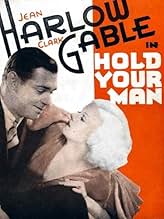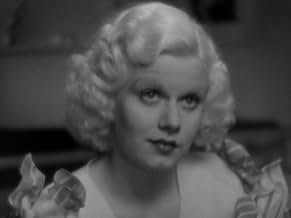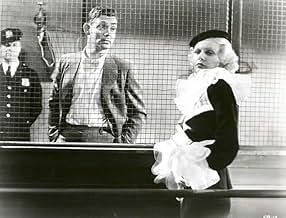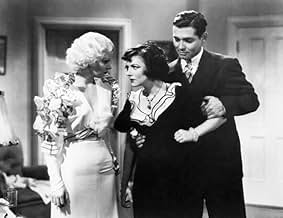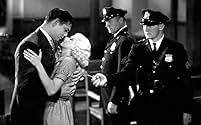IMDb-BEWERTUNG
6,9/10
1989
IHRE BEWERTUNG
Füge eine Handlung in deiner Sprache hinzuA woman is sent to a reformatory when her con artist lover flees after killing a man during a botched blackmail scheme.A woman is sent to a reformatory when her con artist lover flees after killing a man during a botched blackmail scheme.A woman is sent to a reformatory when her con artist lover flees after killing a man during a botched blackmail scheme.
- Auszeichnungen
- 2 wins total
Louise Beavers
- Elite Club Attendant
- (Nicht genannt)
Wade Boteler
- Police Sergeant at Reformatory
- (Nicht genannt)
Bobby Caldwell
- Ruby & Eddie's Son
- (Nicht genannt)
Nora Cecil
- Miss Campbell
- (Nicht genannt)
Jack Cheatham
- Policeman
- (Nicht genannt)
G. Pat Collins
- Phil Dunn
- (Nicht genannt)
Nell Craig
- Miss Willard - Reformatory Matron
- (Nicht genannt)
Empfohlene Bewertungen
Hold Your Man finds Jean Harlow, working class girl from Brooklyn falling for con man Clark Gable and getting in all kinds of trouble. The film starts out as his film, but by the time it's over the emphasis definitely switches to her character.
The film opens with Gable pulling a street con game with partner, Garry Owen and the mark yelling for the cops. As he's being chased Gable ducks into Harlow's apartment and being he's such a charming fellow, she shields him.
Before long she's involved with him and unfortunately with his rackets. Gable, Harlow, and Owen try pulling a badger game on a drunken Paul Hurst, but then Gable won't go through with it. Of course when Hurst realizes it was a con, he's still sore and gets belligerent and Gable has to punch him out. But then he winds up dead outside Harlow's apartment and that platinum blond hair makes her easy to identify. She goes up on an accomplice to manslaughter.
The rest of the film is her's and her adjustment to prison life. Her interaction with the other female prisoners give her some very good scenes. I think some of the material was later used for the MGM classic Caged.
Harlow also gets to do the title song and it's done as torch style ballad, very popular back in those days. She talk/sings it in the manner of Sophie Tucker and quite well.
Gable is well cast as the con man who develops a conscience, a part he'd play often, most notably in my favorite Gable film, Honky Tonk.
Still it's Harlow who gets to shine in this film. I think it's one of the best she did at MGM, her fans should not miss it.
The film opens with Gable pulling a street con game with partner, Garry Owen and the mark yelling for the cops. As he's being chased Gable ducks into Harlow's apartment and being he's such a charming fellow, she shields him.
Before long she's involved with him and unfortunately with his rackets. Gable, Harlow, and Owen try pulling a badger game on a drunken Paul Hurst, but then Gable won't go through with it. Of course when Hurst realizes it was a con, he's still sore and gets belligerent and Gable has to punch him out. But then he winds up dead outside Harlow's apartment and that platinum blond hair makes her easy to identify. She goes up on an accomplice to manslaughter.
The rest of the film is her's and her adjustment to prison life. Her interaction with the other female prisoners give her some very good scenes. I think some of the material was later used for the MGM classic Caged.
Harlow also gets to do the title song and it's done as torch style ballad, very popular back in those days. She talk/sings it in the manner of Sophie Tucker and quite well.
Gable is well cast as the con man who develops a conscience, a part he'd play often, most notably in my favorite Gable film, Honky Tonk.
Still it's Harlow who gets to shine in this film. I think it's one of the best she did at MGM, her fans should not miss it.
Clark Gable plays a con man who busts into the life of hard-boiled dame Jean Harlow. He tries to sucker her while she brushes him off with her tough-gal attitude. Despite their cynicism and cons they fall in love. When Gable accidentally kills a man during a sting he runs out leaving loyal Harlow to women's prison where she discovers she's pregnant. Anita Loos' and Howard Emmett Rogers' writing is excellent throughout with many well-drawn and surprising characters (including a Jewish socialist woman inmate and a black woman inmate and her preacher father played with hardly a trace of stereotype). Gable and Harlow show their mettle as actors adding telling nuances and quirks to their characters that send them beyond the typical Gable and Harlow roles. And the direction is much better than you'd expect from Sam Wood. One beautiful shot has Harlow being inducted into the prison, then led out into a surprisingly snowy courtyard as the camera tracks after her. This is one of the best of both the "criminals in love" and "women's prison" genres and has some of the best hard-boiled dialogue ever written.
Jean Harlow and Clark Gable star in "Hold Your Man," a film from 1933.
Gable plays con man Eddie Hall who runs into the apartment of Ruby Adams (Harlow) as he races to escape from the police. She's taking a bath and isn't happy having a strange man in her apartment. But Ruby has no problem taking care of herself.
Though she is dating a sturdy businessman (Stu Erwin) whom she attempts to con for her rent money, Ruby falls for Eddie. She falls for him so hard that she helps him with a con and winds up in prison. One day she gets dizzy. Well, we know what that means. But Eddie hasn't been in touch. Then, one day, she gets word of him from an unlikely person.
The highlight of this film is the snappy dialogue and the wonderful Harlow who, when she's offered a look at Gable's bedroom says, "Send me a picture of it." There was criticism here that when she went into prison, her personality changed, but I disagree. It's obvious in the beginning that she's interested in Eddie, and why wouldn't a woman in love, in prison, and pregnant, show vulnerability? That was the great thing about Harlow - underneath the street-smart wise cracks, there was a sensitivity.
Gable had been ascending the Hollywood ladder by leaps and bounds, and he is delightful here. Both he and Harlow play characters who put up a front, but ultimately their defenses come down.
I enjoyed it.
Gable plays con man Eddie Hall who runs into the apartment of Ruby Adams (Harlow) as he races to escape from the police. She's taking a bath and isn't happy having a strange man in her apartment. But Ruby has no problem taking care of herself.
Though she is dating a sturdy businessman (Stu Erwin) whom she attempts to con for her rent money, Ruby falls for Eddie. She falls for him so hard that she helps him with a con and winds up in prison. One day she gets dizzy. Well, we know what that means. But Eddie hasn't been in touch. Then, one day, she gets word of him from an unlikely person.
The highlight of this film is the snappy dialogue and the wonderful Harlow who, when she's offered a look at Gable's bedroom says, "Send me a picture of it." There was criticism here that when she went into prison, her personality changed, but I disagree. It's obvious in the beginning that she's interested in Eddie, and why wouldn't a woman in love, in prison, and pregnant, show vulnerability? That was the great thing about Harlow - underneath the street-smart wise cracks, there was a sensitivity.
Gable had been ascending the Hollywood ladder by leaps and bounds, and he is delightful here. Both he and Harlow play characters who put up a front, but ultimately their defenses come down.
I enjoyed it.
"Hold Your Man" is significant as Harlow's transitional film from the pre-code days. Although technically the Hays Code did not go into effect until July 1934, studios were to some extent trying to police themselves earlier than that to take some of the heat off. Harlow is significantly de-tuned physically here, from the hot presence a year earlier in "Red-Headed Woman" and "Red Dust". It also appears that to illustrate their ability to police themselves without a formal approval process, the studio tacked on a moralistic second half that turned a very entertaining romantic comedy into a sappy melodrama.
The film begins when depression-era hustler Eddie (Clark Gable) and his pal Slim con a pedestrian out of $30. Running from the police he blunders into an apartment and finds Ruby (Harlow) taking a bath. Ruby turns out to be a bit of a con artist herself and gets rid of the police. Eddie takes off but he has made an impression on Ruby and she arranges an "accidental" meeting. They soon fall in love but their marriage plans are interrupted by Eddie's accidental murder of one of Ruby's marks. He gets away but Ruby gets two years in a reformatory, which is portrayed as an intense Home Economics class.
Until it crashes and burns at the end this is a slick little romantic comedy written by Anita Loos (Gentlemen Prefer Blondes). Gable provides his standard bravado and Harlow gives it right back to him. The script is quite clever and entertaining. Gable does not have quite the chemistry with Harlow that he had with Claudette Colbert or Rosalind Russell, but this is the kind of film that is best when its two stars are competing instead of cuddling.
Unfortunately the audience's identification impulse and emotional connection are casualties of Harlow's abrupt personality change from gritty seductress to dewy-eyed self-pitying victim. This confuses and distances those who were most involved in the story until that point.
Then again, what do I know? I'm only a child.
The film begins when depression-era hustler Eddie (Clark Gable) and his pal Slim con a pedestrian out of $30. Running from the police he blunders into an apartment and finds Ruby (Harlow) taking a bath. Ruby turns out to be a bit of a con artist herself and gets rid of the police. Eddie takes off but he has made an impression on Ruby and she arranges an "accidental" meeting. They soon fall in love but their marriage plans are interrupted by Eddie's accidental murder of one of Ruby's marks. He gets away but Ruby gets two years in a reformatory, which is portrayed as an intense Home Economics class.
Until it crashes and burns at the end this is a slick little romantic comedy written by Anita Loos (Gentlemen Prefer Blondes). Gable provides his standard bravado and Harlow gives it right back to him. The script is quite clever and entertaining. Gable does not have quite the chemistry with Harlow that he had with Claudette Colbert or Rosalind Russell, but this is the kind of film that is best when its two stars are competing instead of cuddling.
Unfortunately the audience's identification impulse and emotional connection are casualties of Harlow's abrupt personality change from gritty seductress to dewy-eyed self-pitying victim. This confuses and distances those who were most involved in the story until that point.
Then again, what do I know? I'm only a child.
I always loved Rita Hayworth and Ava Gardner, but not so much Jean Harlow. Me = dumb. I'd only seen clips of her films here and there. I always thought she was a hot one-liner, a glamour girl. But after seeing this, my first full length Jean Harlow experience, I admit that Miss Harlow was a truly great screen artist with the gift of creating rich characters. I simply fell in love with her, not because she was the first blonde bombshell or because she died young and became a legend. In this film, Miss Harlow's character is multi-dimensional beyond the traditional 1930's moll. She starts out one place and travels an arduous journey to end up on the other side of life. I loved her tough exterior. I loved her smile. I loved her song at the piano. My God, she was stupendous, she made me burst into tears when she sang her sad song. Most of all, I loved the HAPPY ENDING, Hollywood style. One other thing I was thrilled about was the African American inmate and her preacher father. Anita Loos was SO ahead of her time. She wrote 2 characters who were so lovely and so real. The inmate girl and her father brought such harmony to their scenes with all the white folk. A REVELATION for me. I hate stereotypes.
Wusstest du schon
- WissenswertesWhen Eddie is looking around Ruby's apartment, waiting for his clothes to dry, he spots a pennant on the wall that says "Albany Night Boat." That refers to the steamships that would depart New York City in the early evening for an overnight trip up the Hudson River to Albany. The ships had hundreds of staterooms and often were used---as the film's contemporary audience would know---for romantic getaways or illicit affairs. The pillow Eddie sees next also may have been a souvenir from the ship, as it's inscribed, "We're here to-day/To-morrow we're through/So let's be gay/It is up to you." Such trips peaked in the early 20th century, but started to decline in the 1930s when less costly, speedier, and more efficient modes of transportation by rail and automobile came to the fore. By the 1940s, the Albany Night Boat had virtually ceased to exist.
- PatzerWhen Eddie slams the door after tossing Aubrey Mitchell out of the apartment, the wall shakes.
- VerbindungenFeatured in Sexbombe (1933)
- SoundtracksHold Your Man
(1933) (uncredited)
Music by Nacio Herb Brown
Lyrics by Arthur Freed
Played on a record and sung by Harriet Lee
Reprised by Jean Harlow, playing piano and singing
Top-Auswahl
Melde dich zum Bewerten an und greife auf die Watchlist für personalisierte Empfehlungen zu.
- How long is Hold Your Man?Powered by Alexa
Details
- Erscheinungsdatum
- Herkunftsland
- Sprache
- Auch bekannt als
- Hold Your Man
- Drehorte
- Produktionsfirma
- Weitere beteiligte Unternehmen bei IMDbPro anzeigen
Box Office
- Budget
- 266.000 $ (geschätzt)
- Laufzeit1 Stunde 27 Minuten
- Farbe
- Seitenverhältnis
- 1.37 : 1
Zu dieser Seite beitragen
Bearbeitung vorschlagen oder fehlenden Inhalt hinzufügen



